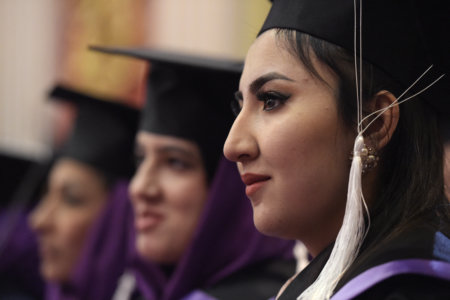
There’s no denying that international education is critical in widening opportunities for all.
Research shows that international education helps individuals achieve higher economic mobility and better job prospects.
That’s not to distract from the many benefits education brings to the individual — widening their perspectives and introducing them to new ways of problem-solving.
Such a mindset is incredibly important for anyone wishing to progress in their lives and career — but it is especially so for Malaysian women.
While the number of educated women in Malaysia is increasing, just as many are held back. Reasons include family commitments, personal responsibilities, and a lack of exposure.
For educated women like Kristina Rai, this was the most significant lesson she learned from attending an international university.
“Education opens you to, if not like-minded people, then people who value learning,” Rai shares.
The desire to constantly grow and learn guided Rai through more than 30 years of her career. As a scholar of Malaysia’s Central Bank (or Bank Negara, as it’s referred to locally), she’s gone from strategy to international relations — seeking new experiences to increase her knowledge and expertise in different areas.
It’s led her where she is today: the COO of Asia School of Business, an innovative institution working with the MIT Sloan School of Management to deliver forward-thinking MBA and leadership programmes.
We speak to her about her journey as a Malaysian woman in leadership — and how education was the central driving force in helping her achieve her aspirations.

Rai now helms the Asia School of Business, which aims to provide programmes to elevate and empower men and women in Asia. Source: Asia School of Business
The importance of being an educated woman
Growing up, Rai was always a focused student. She got her As and aced all her exams.
More than that, she was influenced by her father’s words.
“My dad used to tell me: you’re a girl, so you have to study hard because if your marriage is not great, you can leave the man,” she recalls. “When I look back, it was a practical piece of advice,” the Malaysian recalls.
That is a reality for many women around the world. It’s common knowledge that educating girls is the most effective way to end child marriage. Other research shows that educated women tend to maintain stable marriages and leave violent ones.
“My mother was a homemaker,” she explains.
“And all her friends were homemakers as well. The mantra from her was that when you don’t have an education, you’re stuck, you have no choice but to stay in a bad marriage. That was the norm back then — you would hear more about how women endured.”
It was a powerful message that stuck with her for years.
Upon graduating from school, Rai went on to win a scholarship from Bank Negara. They sent her to Universiti Malaya — Malaysia’s oldest and highest-ranking higher education body — and the University of Manchester for her master’s.
Since then, she carved out a long and impressive career for herself — one that could not have been possible without her education.
“I think education gives you a sense of self-sustainability,” she enthuses.
“I got a job on my own merit. I could get my own house, a loan for my own car — all my cars, I bought myself. The person I could choose in my life was never determined by how much they earned. It made the partnership more balanced.”

An education can help empower women to choose what she wants rather than what she needs. Source: Asia School of Business
Career or family — why do women have to choose?
Educated women get a reputation for being too career-focused — something which Rai believes is untrue.
She noticed it herself when the time came for her to want to start a family.
A survey in 2019 found that one in eight companies was reluctant to hire women who could become pregnant. The same survey revealed that one in seven companies take this and any existing children a woman might have into account when awarding promotions.
As such, educated women are faced with a seemingly impossible choice: sacrifice their career or family.
“For women, I think that having a young child really takes a lot out of us because we have this guilt muscle in us,” Rai says.
“I wasn’t there for my son’s first birthday. It didn’t really matter to him — of course, he couldn’t remember my absence. But I still felt a lot of guilt, like it was something I should have done. And that’s one thing I learned — that you should know what’s important in your life.”
Fortunately, Bank Negara never gave her the ultimatum of choosing — and gave her two years off work.
“I had people who said that it would affect my career and my progression,” she recalls.
“But the fact of the matter was that I wanted to spend time with my family. When I looked back at it, nothing was severely impacted. I’m very lucky to have had kind and compassionate bosses in the past — but I do think this is something society is moving away from, and I can’t understand why we do that.”

At Asia School of Business, no one is held back because of their gender. Source: Asia School of Business
Building a programme that elevates women
As evidenced by Rai, educated women are just as capable as men of carving out successful careers for themselves — sometimes even more so.
In her role as COO at Asia School of Business, she’s working on creating business programmes that will benefit both men and women in their careers and as individuals.
More than that, she hopes to instil a growth mindset in Malaysians — something she believes is gained through international exposure.
“The business teaching here gives students incredible exposure to another side of the world: the US,” shares the COO of Asia School of Business.
“In an Asian setting, we are not as encouraged to do so. In our culture, it’s more common to give deference to someone because of their position.
But with us, we have MIT faculty who come to this side of the world to teach. In their classes, everyone is encouraged to ask questions and give their opinions.”
Indeed, Malaysia scores highest on the Power Distance Index, which indicates the level of deference a society has towards authority figures.
The results show that Malaysians are simply not brought up to defy people in positions of authority — by the simple fact that it is considered disrespectful.
For women, who are already at a disadvantage for their gender, this can be even more harmful.
In this, Rai hopes that programmes like the ones offered by Asia School of Business can help change that tendency.
“It’s important that our students — especially women — are exposed to environments where they are encouraged to question and give their opinions on things,” Rai explains.
“This helps them build confidence. Because women take home so much, and society still expects us to take so much — so it’s important that we learn to stand our ground.”
Today, Rai is not the best homemaker. She isn’t a traditional wife and never really spent enough time learning to cook when her mother invited her.
“In the end, I don’t cook great,” she says.
“But I’m not stuck — and that’s very liberating.”










